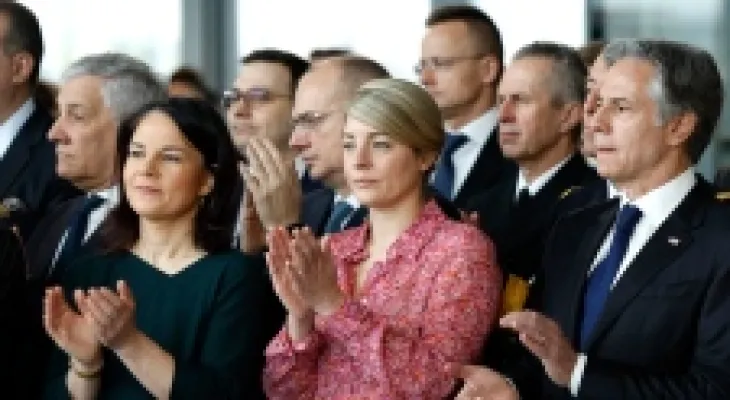Search here
Newspaper
Search here

Arab Canada News
News

Published: April 4, 2024
Brussels is hosting foreign ministers from 32 countries this week on the occasion of the 75th anniversary of the founding of the North Atlantic Treaty Organization (NATO).
While the alliance celebrates its founding anniversary, it is staring at the familiar threat of an unpredictable Russia.
It is also preparing for the possibility of another serious situation it has faced before, which is Donald Trump taking the U.S. presidency.
Recently, the leading Republican candidate in the race said he warned allies during his presidency that the United States would not protect "rogue" countries that do not meet spending targets.
Trump recounted saying, "No, I will not protect you, in fact, I would encourage (Russia) to do whatever they want, you have to pay your bills."
Despite similar comments during his presidency, Trump supported NATO's collective defense clause, but there are concerns that things would be different if he returns to the White House after the November elections.
Bret Bruen, former director of global engagement under former Democratic President Barack Obama, said there might be fewer "emergency brakes" in effect, with many Republicans long averse to participation in a second Trump White House.
Bruen added, "In this case, allies will need a plan to win his support, think of big, flashy defense spending announcements, with Trump as the guest of honor at a military parade, noting that the key is 'to package it up and put a big bright bow on top, making it look like he single-handedly brilliantly fixed NATO.'"
Bruen said, "Trump is, ultimately, a negotiator and businessman, I think he can be wooed and convinced to stay in NATO."
Meanwhile, Republicans and Democrats alike wonder whether allies are getting more than they give.
There is fierce debate in Washington about ongoing support for Ukraine, the aspiring NATO member, in its war against Russia.
Bruen continued: "I think the real question at this moment is whether NATO is at the last moment of its strength or not."
Kerry Buck, former Canadian ambassador to NATO, said the Russian invasion forced the alliance to become stronger, noting that European countries "have started to become more serious about defense."
She added, "If the United States starts to reduce its presence, I do not expect NATO to collapse immediately."
On Wednesday, journalists in Brussels asked Canadian Foreign Minister Mélanie Joly if she was worried that a future Trump administration would mean the end of U.S. aid to Ukraine.
She said, "I am convinced that the United States will find a way to continue supporting Ukraine."
18 allies are expected to meet or exceed the agreed target of spending at least 2% of GDP on defense this year, including 20% of this funding on new major equipment.
NATO Secretary General Jens Stoltenberg praised this positive news, but the data also shows that Canada is lagging behind, spending only 1.33 percent of its GDP on defense.
Anisa Kimball, professor of political science and international relations at Laval University, said, "This is a bad overview."
While Canada is not alone, it has a longer way to go than any other ally. To close this gap, it will need to spend an estimated additional $18 billion annually.
Defense Minister Bill Blair said at the National Defense and Security Conference last month that the country "must spend more and will do so." Meanwhile, his administration was asked to provide $1 billion in savings each year for the next three years.
At the last summit of Lithuanian leaders last July, Prime Minister Justin Trudeau insisted that allies are not pressuring him for money.
But Kimball said it has become clear that they want to see a plan for how Canada will get there.
She said the anniversary represents an opportunity, and Canada can call on NATO to update its spending agreement.
For example, Canada has a lot of work to do to build critical infrastructure—roads, airports, fuel, and internet—in the North. This kind of spending would not be considered defense and security for NATO purposes, but Kimball said there is an argument that it should be.
She added, "Other countries are better at including these things in their defense spending because they did it legislatively," referring to Belgium, which classified railways as critical national security and defense infrastructure.
Bruen said Canada will need to provide more funding, whether Trump or no Trump. "I don’t think Canada can do this cheaply."
To gain political support at home, Kimball said Canada could take the lead on emerging alliance priorities.
She added, "For example, NATO's handling of climate change and focus on the Arctic makes NATO more important in Canadian defense and security."
All Nordic countries except Russia are now members, with Sweden and Finland joining in the past two years.
Buck said this gives NATO a reason to be strategically interested in an area it has avoided in the past, an area Canada is already focused on.
She said, "We must use multilateral bodies like NATO to build greater partnership with other Arctic countries and ensure we have better military readiness, better military presence, better civilian presence."
"To make sure our Arctic remains our Arctic."
Comments